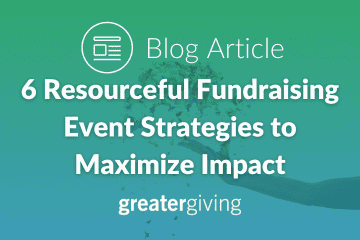
6 Resourceful Fundraising Event Strategies to Maximize Impact
For many charities, events are a cornerstone of their fundraising strategy. From galas and auctions to walkathons and online fundraisers, events not only generate significant revenue but also enhance visibility and donor engagement. However, managing events can be resource-intensive, potentially diverting attention and resources from other critical fundraising areas. The key to balancing event management with overall fundraising efforts lies in strategic resource allocation and efficiency. Here are several ways charities can effectively resource events without compromising other revenue streams.
1. Leverage Volunteers
Volunteers are invaluable in your fundraising event strategy. They can assist with planning, logistics, promotion, and on-the-day activities, reducing the burden on staff. Effective volunteer recruitment and management strategies are crucial:
- Recruitment: Actively seek out volunteers with relevant skills and experience. Platforms like VolunteerMatch can help find dedicated individuals passionate about your cause.
- Training and Coordination: Provide comprehensive training and clear guidelines to ensure volunteers understand their roles and responsibilities. A well-coordinated volunteer team can significantly streamline event operations.
- Recognition: Show appreciation for volunteers through recognition programs, which can enhance retention and foster a supportive community around your cause.
2. Utilize In-Kind Donations and Sponsorships
Securing in-kind donations and sponsorships can dramatically reduce event costs. This includes venue spaces, catering, entertainment, and prizes. Building strong relationships with local businesses and organizations can lead to mutually beneficial partnerships:
- In-Kind Donations: Approach local businesses to donate goods or services. This not only cuts costs but also involves the community in your cause.
- Sponsorship Packages: Offer tailored sponsorship packages that provide businesses with marketing opportunities in exchange for their support. Highlight the benefits of exposure to your audience and the positive impact on their corporate social responsibility.
3. Adopt Technology Solutions
Fundraising Technology implementation can enhance efficiency in event management and reduce manual workload. Various digital tools can streamline processes and improve overall fundraising event strategies:
Event Management Software
Platforms like Greater Giving can handle registrations, ticket sales, and communication, simplifying the administrative burden.
Virtual and Hybrid Events
Leveraging online platforms for virtual or hybrid events can reduce costs associated with physical venues and logistics, while still engaging a wide audience.
Social Media and Email Marketing
Use digital marketing tools to promote your event effectively without significant financial outlay. Scheduled posts and automated email campaigns can reach a broad audience with minimal ongoing effort.
4. Collaborate with Other Organizations
Partnering with other charities or organizations for events can share the workload and costs. Collaborative events can also attract a larger, more diverse audience:
Joint Events
Co-host events with complementary organizations to pool resources, share expertise, and amplify your reach.
Resource Sharing
Collaborate on logistics, marketing, and volunteer resources to maximize efficiency and reduce duplication of efforts.
5. Focus on Scalable Events
Design events that can be scaled up or down based on available resources. This flexibility ensures that the event can proceed effectively regardless of budget constraints:
Modular Planning
Break down the event into modular components that can be added or removed based on resource availability. This ensures core elements are retained even if budget adjustments are necessary.
Pilot Smaller Events
Start with smaller, manageable events and gradually scale up as your organization becomes more adept at handling larger-scale operations.
6. Post-Event Analysis and Feedback
Conducting thorough post-event analysis can identify areas for improvement and help streamline future events. This continuous improvement cycle ensures resources are used more efficiently over time.
Feedback Collection
Gather feedback from attendees, volunteers, and staff to understand what worked well and what could be improved.
Data Analysis
Analyze event data to identify trends, cost-saving opportunities, and areas that delivered the highest return on investment.
Balancing Your Fundraising Event Strategies
Balancing event management with other fundraising activities is a common challenge for charities. By leveraging volunteers, securing in-kind donations and sponsorships, utilizing technology, collaborating with other organizations, focusing on scalable events, and conducting post-event analysis, charities can resourcefully use these fundraising event strategies effectively without detracting from other revenue streams. Strategic planning and efficient resource allocation not only ensure successful events but also support overall organizational sustainability and growth.
